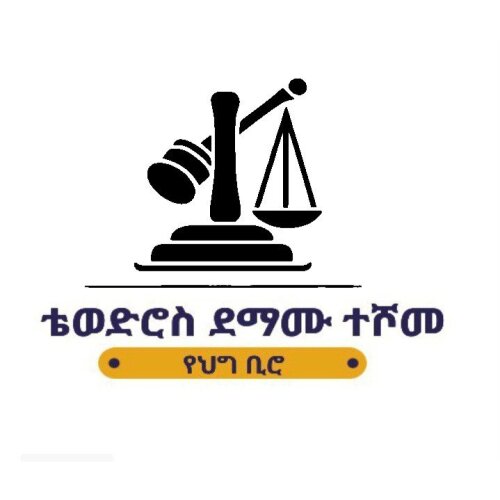Best Lawsuits & Disputes Lawyers in Ethiopia
Share your needs with us, get contacted by law firms.
Free. Takes 2 min.
Or refine your search by selecting a city:
List of the best lawyers in Ethiopia
About Lawsuits & Disputes Law in Ethiopia
Lawsuits and disputes law in Ethiopia is shaped by the nation's Civil Code, which provides a comprehensive legal framework for civil matters. The judicial system upholds these laws through multiple court levels, including First Instance Courts, High Courts, and the Federal Supreme Court. This legal structure aims to address disputes efficiently and fairly, ranging from commercial to personal issues. Importantly, Ethiopia also recognizes customary laws in certain regions, accommodating traditional dispute resolution mechanisms alongside formal legal processes.
Why You May Need a Lawyer
There are several scenarios where individuals may require legal assistance regarding lawsuits and disputes in Ethiopia:
- Business Disputes: Conflicts between businesses or within partnerships often require legal mediation or representation.
- Property Disputes: Disputes over land ownership or property boundaries can necessitate a lawyer to navigate complex regional laws.
- Contractual Disagreements: Breach of contract cases, involving failure to fulfill contractual obligations, often require legal expertise.
- Family Law Issues: Matters like divorce, child custody, or inheritance disputes may need legal intervention.
- Employment Disputes: Issues such as wrongful termination or workplace harassment cases may benefit from legal support.
- Debt Collection: Disputes over unpaid debts can lead to lawsuits that require legal clarification and enforcement.
Local Laws Overview
Key legal aspects relevant to lawsuits and disputes in Ethiopia include:
- Civil Code: The backbone of private law, detailing obligations, contracts, and tort laws.
- Civil Procedure Code: Governs the legal processes for civil lawsuits, including filing, evidence, and court procedures.
- Commercial Code: Addresses business-related disputes, covering areas like trade partnerships and corporate governance.
- Customary Law: In some areas, customary laws can influence dispute resolution, occasionally overriding formal law.
- Land Proclamation: Specific regulations may apply to rural and urban landownership and usage disputes.
Frequently Asked Questions
What is the first step in filing a lawsuit in Ethiopia?
The initial step involves submitting a statement of claim to the court of jurisdiction. It includes a clear account of the dispute and the legal relief sought.
How long does it typically take for a dispute to be resolved in Ethiopian courts?
The timeline can vary significantly depending on the complexity of the case, but civil cases may range from several months to a few years.
Can disputes be resolved outside the court system in Ethiopia?
Yes, alternative dispute resolution methods like mediation and arbitration are available and encouraged for faster resolution.
Is legal assistance necessary for small claims disputes?
While not mandatory, legal advice is often beneficial even for small claims to ensure that your rights are fully protected.
What are the costs involved in filing a lawsuit?
Costs may include court fees, legal representation fees, and potential administrative expenses.
What is the role of customary law in resolving disputes?
In certain regions, customary laws play a significant role, often complementing or substituting the formal legal processes.
How are foreign judgments recognized in Ethiopia?
Ethiopia requires foreign judgments to go through recognition proceedings before being enforced, focusing on reciprocal agreements.
What happens if the opposing party does not respond to a lawsuit?
The court may issue a default judgment if the defending party fails to respond timely without a valid reason.
Can individuals represent themselves in Ethiopian courts?
Yes, individuals can represent themselves, but having legal counsel is advisable for complex cases.
What is a statute of limitations for filing a lawsuit in Ethiopia?
It varies by case type, but generally, it's essential to file within specific periods outlined in the Civil Code to avoid being barred from court.
Additional Resources
For those seeking additional information or support, consider reaching out to the following:
- Ministry of Justice: Offers guidance and supports individuals dealing with legal issues.
- Legal aid organizations: Provide assistance, particularly for those who cannot afford private legal counsel.
- Chambers of Commerce: Can offer advice for business-related disputes.
Next Steps
If you need legal assistance for a lawsuit or dispute in Ethiopia, consider the following steps:
- Consult with a licensed attorney specializing in your specific area of concern.
- Gather all relevant documentation and evidence pertaining to your case.
- Consider alternative dispute resolution methods if appropriate.
- Contact the Ethiopian Bar Association or similar bodies for attorney referrals.
- Be proactive in understanding your rights and obligations under Ethiopian law.
Lawzana helps you find the best lawyers and law firms in Ethiopia through a curated and pre-screened list of qualified legal professionals. Our platform offers rankings and detailed profiles of attorneys and law firms, allowing you to compare based on practice areas, including Lawsuits & Disputes, experience, and client feedback.
Each profile includes a description of the firm's areas of practice, client reviews, team members and partners, year of establishment, spoken languages, office locations, contact information, social media presence, and any published articles or resources. Most firms on our platform speak English and are experienced in both local and international legal matters.
Get a quote from top-rated law firms in Ethiopia — quickly, securely, and without unnecessary hassle.
Disclaimer:
The information provided on this page is for general informational purposes only and does not constitute legal advice. While we strive to ensure the accuracy and relevance of the content, legal information may change over time, and interpretations of the law can vary. You should always consult with a qualified legal professional for advice specific to your situation.
We disclaim all liability for actions taken or not taken based on the content of this page. If you believe any information is incorrect or outdated, please contact us, and we will review and update it where appropriate.
Browse lawsuits & disputes law firms by service in Ethiopia
Ethiopia Attorneys in related practice areas.
Browse lawsuits & disputes law firms by city in Ethiopia
Refine your search by selecting a city.

















